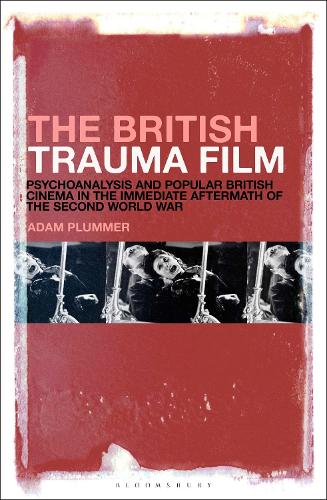
The British Trauma Film: Psychoanalysis and Popular British Cinema in the Immediate Aftermath of the Second World War
(Paperback)
Publishing Details
The British Trauma Film: Psychoanalysis and Popular British Cinema in the Immediate Aftermath of the Second World War
By (Author) Adam Plummer
Bloomsbury Publishing USA
Bloomsbury Publishing USA
28th November 2024
United States
Classifications
Professional and Scholarly
Non Fiction
791.43094109045
Physical Properties
Paperback
240
Width 150mm, Height 226mm, Spine 16mm
360g
Description
While the historical influence of psychoanalysis on Hollywood cinema has received considerable attention, the same cannot be said for its influence on British cinema. This book examines the central position that psychoanalysis occupies in British cinema in the years immediately following the Second World War. Plummer uses a critical theory framework to understand the role that psychoanalysis plays in British culture at this time as an historical discourse, and in British cinema as a narrative, a cultural, and an ideological discourse. He defines these as arising within various areas of contemporary psychoanalytic thinking related to traumatic wartime experience, sexual difference, and the interplay between subjectivity and objectivity. He analyzes six British films of the period: The Halfway House, Dead of Night, The Seventh Veil, Madonna of the Seven Moons, They Made Me a Fugitive, and Mine Own Executioner and demonstrates how psychoanalysis operates within them as a narrative and formal structuring mechanism. He argues that this engagement enables these films to begin to address the emotional fallout of the war by creating safe representational spaces where contemporary audiences could engage with their own traumatic experiences. While The British Trauma Film defines psychoanalysis as providing a language for British cinema at this time to confront the effects of wartime trauma, it finds that it also operates within a normalizing ideological system designed to reproduce dominant pre-war relations of political, social, and sexual power. However, in this group of films, this system is often countered by subversive discursive forces that seem to be immanent to the films themselves.
Reviews
The British Trauma Film is a revisionist account of a group of films released in the immediate post-war period that work through the experience of trauma, articulating important social concerns as well as depicting psychological disturbance. This lucid study provides a new perspective on a particular historical moment that adds significantly to our understanding of British cinema. * Andrew Spicer, Professor of Cultural Production, UWE Bristol, UK *
In this wide-ranging and original work, Adam Plummer charts a fascinating journey, revealing the influence of psychoanalysis on British cinema from the post-war period. Arguing that psychoanalysis occupies a central role in films such as The Halfway House, Dead of Night, The Seventh Veil, Madonna of the Seven Moons, They Made Me a Fugitive, and Mine Own Executioner, Plummer makes a compelling case for the critical value of reflecting on the meaning that psychoanalysis carried during a turbulent period of social and cultural change in the British context. In a masterful move, Plummer moves beyond the analysis of film at the textual level to develop a rich argument about the ways in which cinema in all its specificity was put to work as a means of processing traumatic experience, loss, and the emotional fallout from war. Drawing extensively on critical and psychoanalytical ideas about the workings of ideology, he goes still further to reveal how the apparently normative deployment of psychoanalysis on screen provides valuable spaces for resistant and subversive social practices linked to gender and the dynamics of sexual difference. This is an innovative study grounded in the empirical analysis of press packs, reviews, scripts, and close textual analysis, all of which brings to life the sophisticated theoretical argument at the heart of the work. A must read for any scholar interested in the value of psychoanalytic approaches to culture broadly defined and for scholars of cinema and its histories. * Caroline Bainbridge, Emeritus Professor of Culture and Psychoanalysis, University of Roehampton, UK *
Author Bio
Adam Plummer has taught film theory, film history, and film philosophy at Queen Mary University of London, UK, and is now an independent writer and researcher based in the UK.
